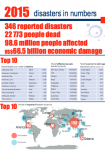11 February 2016: The UN Office for Disaster Risk Reduction (UNISDR) has released an analysis showing that 2015, which was the hottest year on record, confirmed that weather and climate-related disasters dominate disaster trends linked to natural hazards.
Robert Glasser, head of UNISDR, said that the analysis reaffirmed that reducing greenhouse gases and adapting to climate change are critical for reducing disaster risk.
 11 February 2016: The UN Office for Disaster Risk Reduction (UNISDR), the Catholic University of Louvain Brussels, Belgium, and the United States Agency for International Development (US AID) have released an infographic on disaster trends showing that 2015, which was the hottest year on record, confirmed that weather and climate-related disasters dominate disaster trends linked to natural hazards. Robert Glasser, Head of UNISDR, said the analysis reaffirms the key role of greenhouse gas (GHG) reductions and climate change adaptation for disaster risk reduction (DRR).
11 February 2016: The UN Office for Disaster Risk Reduction (UNISDR), the Catholic University of Louvain Brussels, Belgium, and the United States Agency for International Development (US AID) have released an infographic on disaster trends showing that 2015, which was the hottest year on record, confirmed that weather and climate-related disasters dominate disaster trends linked to natural hazards. Robert Glasser, Head of UNISDR, said the analysis reaffirms the key role of greenhouse gas (GHG) reductions and climate change adaptation for disaster risk reduction (DRR).
The analysis concludes that, in 2015, China, the US, India, the Philippines and Indonesia were affected by the highest number of disasters in 2015. It also finds that 98.6 million people were affected by disasters, and that climate was a factor in 92% of those events, with the 32 major droughts having the greatest impact, affecting approximately 50.5 million people. The infographic also indicates that floods had the second-greatest impact, with 152 floods affecting 27.5 million people and taking 3,310 lives. In terms of regional impact, the infographic shows that Asia and the Pacific were impacted the most by storms in 2015, including 48 cyclone-strength storms, brought on, in large part, by climate change. Globally, storms led to 996 deaths and affected 10.6 million people in 2015. Glasser said that the Nepal earthquake confirmed that earthquakes are the most deadly natural hazard category and underscored the importance of ensuring compliance with building codes.
Debarati Guha-Sapir, Centre for Research on the Epidemiology of Disasters (CRED), which also contributed to the analysis, emphasized that early warnings are having an impact in the case of storms, and called for further investment in such systems. She also said that mortality from extreme temperatures are underestimated and require better evaluation of their impact.
The analysis further finds that for 2015: earthquakes and tsunamis killed 9,525 people and affected 7.2 million people; landslides, triggered by heavy rains, killed 1,369 people and affected 50,332; wildfires killed 66 people and affected approximately 495,000; and India, France and Pakistan suffered from some of the most severe heat waves.
In a statement, Glasser said that the effects of 2015 as the hottest year on record will be felt well into 2016 as some 24 million people are struggling with drought and food insecurity in the Horn of Africa and across Southern Africa. He called for practical steps to be taken, such as improving water storage facilities to support drought-exposed households and reduce their vulnerability. He added that the number of deaths from storms decreased in 2015 due to investment in disaster preparedness and risk reduction, including early warning systems such as the CREWS (Climate Risk Early Warning System) initiative, to help those countries with rudimentary warning and forecasting systems.
The release of the analysis coincides with work being undertaken by the Open-ended Intergovernmental Expert Working Group on Indicators and Terminology Relating to DRR to agree on indicators that will help countries measure progress in achieving the targets of the the Sendai Framework on DRR, including developing a common classification of types of hazards. [UNISDR Press Release] [UN Press Release] [Statement of Head of UNISDR] [Infographic on Disaster Trends] [IISD RS Story on the Second Meeting of the Open-ended Intergovernmental Expert Working Group on Indicators and Terminology Relating to DRR]